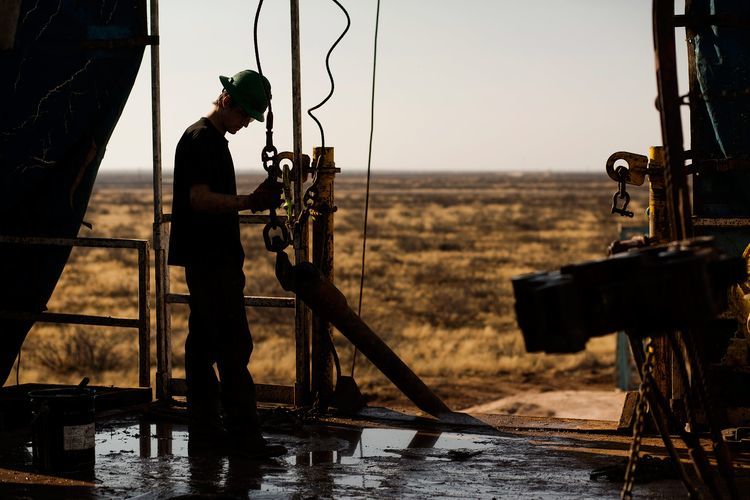
Oil closed at the lowest level in more than two months in New York as the dollar rose against its peers and global crude markets were deemed comfortably supplied despite threats to output.
Futures fell 1.3 percent as the dollar advanced to a six-week high, curbing the appeal of commodities as an investment. U.S. crude supplies remain ample even as government data is projected to show that nationwide stockpiles slipped for a ninth week. Oil prices briefly rose after Goldman Sachs Group Inc. said U.S. crude output will decline more than previously forecast and an industry report said that the pace of North Sea oil-field shutdowns would grow.
“The market rallied after the report from Goldman projecting lower U.S. output and another on how Brexit will increase the pace of North Sea shutdowns,” said Bob Yawger, director of the futures division at Mizuho Securities USA in New York. “Prices soon retreated because of the dollar’s strength. It’s been very difficult, especially in the last couple of weeks, for crude to move in the same direction as the dollar.”
While oil is still about 70 percent above the 12-year low reached in February, prices have slipped from almost $52 in early June amid signs of weaker demand growth. Though a global supply glut is shrinking as American crude output falls, the market recovery will remain volatile as U.S. drillers use the rebound to place hedges that could help them boost output, BMI Research said.
Dollar Rally
West Texas Intermediate for August delivery, which expires Wednesday, fell 59 cents to close at $44.65 a barrel on the New York Mercantile Exchange. It’s the lowest settlement since May 9. Total volume traded was 18 percent below the 100-day average at 4:42 p.m. The more-active September contract dropped 49 cents to $45.45.
Futures were little changed from the settlement after the industry-funded American Petroleum Institute was said to report U.S. crude supplies fell 2.3 million barrels last week. WTI traded at $46.60 at 4:43 p.m in New York.
Brent for September settlement slipped 30 cents, or 0.6 percent, to close at $46.66 a barrel on the London-based ICE Futures Europe exchange. The contract settled at a $1.21 premium to WTI for September delivery.
The Bloomberg Dollar Spot Index, a gauge of the greenback against 10 major peers, rose as much as 0.7 percent to the highest level since June 3. A stronger greenback curbs investor appetite for dollar-denominated raw materials.
Downward Pressure
“The strength of the dollar is putting a little downward pressure on commodities,” said Bill O’Grady, chief market strategist at Confluence Investment Management in St. Louis, which oversees $4.9 billion. “The best argument for commodities, and crude in particular earlier this year, was the soft dollar.”
The pace of North Sea oil-field shutdowns is picking up as the impact of the price slump is compounded by the uncertain investment environment created by Brexit. Projected spending on decommissioning in the British sector in the decade to 2024 has risen to 16.9 billion pounds ($22.4 billion), industry group Oil & Gas U.K. said. That’s 16 percent higher than a 10-year forecast in 2014.
U.S. production will decline by an average 370,000 barrels a day in 2017, Goldman Sachs analysts Damien Courvalin and Raquel Ohana wrote in e-mailed note dated July 18. That compares with a 360,000 barrel drop projected in a July 11 report.
Rebel Attacks
Militants in Nigeria targeted the Warri pipeline, newspaper ThisDay reported, citing security forces it didn’t name. A spokesman for Nigerian National Petroleum Corp. said he was unable to confirm the attack immediately.
For a story on why Nigeria’s oil wells are being blown up again, click here.
U.S. government data will probably show on Wednesday that crude stockpiles dropped by 2 million barrels last week, according to a Bloomberg survey. The Energy Information Administration is projected to report that supplies of gasoline fell in the week ended July 15 while those of distillate fuel grew.
“We are oversupplied in products and crude as well,” O’Grady said. “We will get through the overhang in supply but it won’t happen in 2016.”
Oil-market news:
Oil workers are planning strikes that may affect production at some of Royal Dutch Shell Plc’s fields in the North Sea. About 400 workers plan to walk out on July 26, the Unite union said in a statement. A venture between Arab Petroleum Investment Corp. and National Shipping Co. of Saudi Arabia will create the world’s largest fleet of oil tankers and support the kingdom’s plan to boost crude exports, Saudi Energy Minister Khalid Al-Falih said.
Recommended for you
